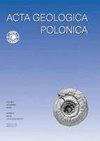Campanian–古新世Jaworzynka组在其类型区域(Magura Nappe,外喀尔巴阡山脉)
IF 0.9
4区 地球科学
Q3 GEOLOGY
引用次数: 3
摘要
Campanian-古新世Jaworzynka组是波兰外喀尔巴阡山脉Magura Nappe序列的一部分,根据其详细的岩石和生物地层学进行了描述。该地层沿着Siary单元的边缘部分延伸,从西里西亚Beskid Mts的Jaworzynka层型区域一直延伸到Beskid Wyspowy Mts的Mszana Dolna区域。其在捷克共和国Moravskoslezske Beskydy Mts的等效地层为Solań地层。在层型区,地层结构复杂。我们区分了四个岩性单元,即黑云母砂岩和页岩(i)、页岩(II)、Mutne砂岩段(III)和薄层浊积岩(IV),并首次提供了特定单元的详细生物地层学。第一个单元是地层中最突出的部分。它沉积于Campanian纪中期——最早的马斯特里赫特阶,位于Caudamina gigantea带的上部,直至Rzehakina inclusa带的下部。第二个单元仅局部出现,其年龄仅限于马斯特里赫特阶和Rzehakina inclusa带。第三个单元由厚层砂岩组成,在某些部分可能形成超过地层总厚度一半的厚度。年龄为晚马斯特里赫特阶-大丹阶,位于Rzehakina-inclusa带的上部和Rzehakana-fissistomata带的下部。它通常被薄包裹的薄层浊积砂岩和大年-塔奈时代的页岩以及Rzehakina裂变带的有孔虫所覆盖。本文章由计算机程序翻译,如有差异,请以英文原文为准。
Campanian–Paleocene Jaworzynka Formation in its type area (Magura Nappe, Outer Carpathians)
The Campanian–Paleocene Jaworzynka Formation, a part of the Magura Nappe succession in the Polish Outer Carpathians, is described in terms of its detailed litho- and biostratigraphy. The formation stretches along the marginal part of the Siary Unit, from the Jaworzynka stratotype area in the Silesian Beskid Mts up to the Mszana Dolna area in the Beskid Wyspowy Mts. Its equivalent in the Moravskoslezske Beskydy Mts of the Czech Republic is the Solaň Formation. In the stratotype area, the formation displays complex structure. We distinguish four lithological units, i.e. Biotite Sandstone and Shale (I), Shale (II), Mutne Sandstone Member (III) and Thin-bedded Turbidite (IV) and provide the first detailed biostratigraphy of particular units. The first unit forms the most prominent part of the formation. It was deposited in the Middle Campanian–earliest Maastrichtian within the upper part of Caudammina gigantea Zone up to the lower part of the Rzehakina inclusa Zone. The second unit occurs only locally and its age is limited to the Maastrichtian, to the Rzehakina inclusa Zone. The third unit is composed of thick-bedded sandstones that in some parts may form more than the half of the total thickness of the formation. It is Late Maastrichtian–Danian in age and is placed in the upper part of the Rzehakina inclusa Zone and the lower part of the Rzehakina fissistomata Zone. It is usually covered by a thin package of thin-bedded turbiditic sandstone and shales of Danian–Thanetian age with foraminifera of the Rzehakina fissistomata Zone.
求助全文
通过发布文献求助,成功后即可免费获取论文全文。
去求助
来源期刊

Acta Geologica Polonica
地学-地质学
CiteScore
1.70
自引率
18.20%
发文量
0
审稿时长
>12 weeks
期刊介绍:
Acta Geologica Polonica publishes original and review papers on all aspects of basic geology, with particular focus on sedimentology, stratigraphy, palaeontology, regional geology, structural geology, and regional petrography. All papers are published in English.
 求助内容:
求助内容: 应助结果提醒方式:
应助结果提醒方式:


